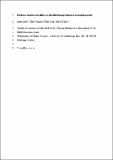Por favor, use este identificador para citar o enlazar a este item:
http://hdl.handle.net/10261/250200COMPARTIR / EXPORTAR:
 SHARE SHARE
 CORE
BASE CORE
BASE
|
|
| Visualizar otros formatos: MARC | Dublin Core | RDF | ORE | MODS | METS | DIDL | DATACITE | |

| Título: | Predator Chemical Cue Effects on the Diel Feeding Behaviour of Marine Protists |
Autor: | Arias Bulbena, Anna CSIC ORCID ; Selander, Erik; Saiz, Enric CSIC ORCID ; Calbet, Albert CSIC ORCID | Palabras clave: | Copepodamide Feeding rhythms Grazing Copepods Microzooplankton Dinoflagellate Ciliates |
Fecha de publicación: | ene-2021 | Editor: | Society for Applied Microbiology | Citación: | Environmental Microbiology 82: 356-364 (2021) | Resumen: | We have assessed the effect of copepod chemical cues on the diel feeding rhythms of heterotrophic and mixotrophic marine protists. All phagotrophic protists studied exhibited relatively high diurnal feeding rates. The magnitude of the diel feeding rhythm, expressed as the quotient of day and night ingestion rates, was inversely related to the time that phagotrophic protists were maintained in the laboratory in an environment without predators. In the case of the recently isolated ciliate Strombidium arenicola, the rhythm was lost after a few months. When challenged with chemical alarm signals (copepodamides) from the copepod Calanus finmarchicus at realistic concentrations (0.6–6 pM), S. arenicola partially re-established diurnal feeding. Conversely, the amplitude of the diel feeding rhythm for the ciliate Mesodinium rubrum was not affected by copepodamides, although the 24-h integrated food intake increased by approximately 23%. For the dinoflagellates Gyrodinium dominans and Karlodinium armiger, copepodamides significantly reduced the amplitude of their diel feeding rhythms; significant positive effects on total daily ingestion were only observed in G. dominans. Finally, the dinoflagellate Oxyrrhis marina, isolated >20 years ago, showed inconsistent responses to copepodamides, except for an average 6% increase in its total ingestion over 24 h. Our results demonstrate that the predation risk by copepods affects the diel feeding rhythm of marine protists and suggests a species-specific response to predation threats | Descripción: | 9 pages, 4 figures, 3 tables, supplementary information https://doi.org/10.1007/s00248-020-01665-9 | Versión del editor: | https://doi.org/10.1007/s00248-020-01665-9 | URI: | http://hdl.handle.net/10261/250200 | DOI: | 10.1007/s00248-020-01665-9 | ISSN: | 1462-2912 | E-ISSN: | 1462-2920 |
| Aparece en las colecciones: | (ICM) Artículos |
Ficheros en este ítem:
| Fichero | Descripción | Tamaño | Formato | |
|---|---|---|---|---|
| Arias_et_al_2021_preprint.pdf | 2,3 MB | Adobe PDF |  Visualizar/Abrir | |
| Arias_et_al_2021_suppl.docx | 13,26 MB | Microsoft Word XML | Visualizar/Abrir |
CORE Recommender
SCOPUSTM
Citations
7
checked on 21-abr-2024
WEB OF SCIENCETM
Citations
6
checked on 21-feb-2024
Page view(s)
61
checked on 24-abr-2024
Download(s)
222
checked on 24-abr-2024
Google ScholarTM
Check
Altmetric
Altmetric
NOTA: Los ítems de Digital.CSIC están protegidos por copyright, con todos los derechos reservados, a menos que se indique lo contrario.
